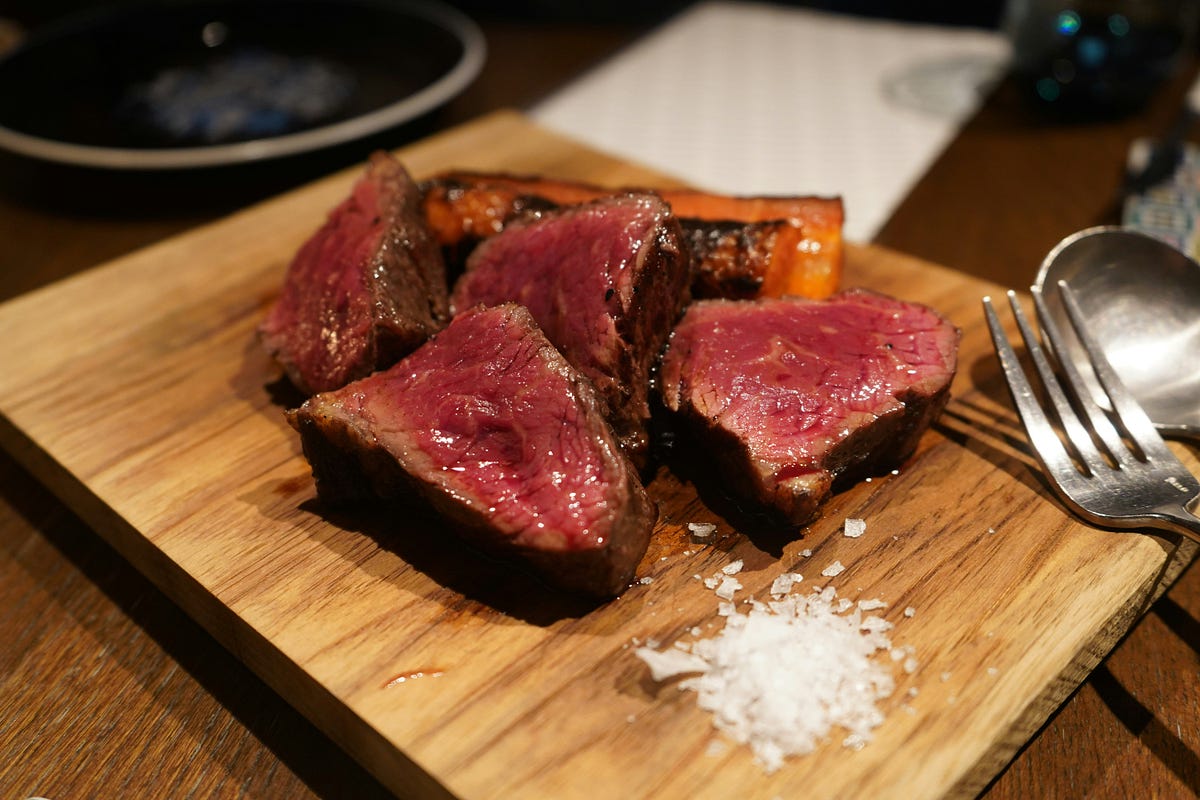WelshBloke
Lifer
- Jan 12, 2005
- 32,473
- 10,614
- 136
People who "cook" use salted butter. People who cook use unsalted butter.
If something needs salt you should add it to taste.
Until i started watching cooking shows i didn't realize there was a thing called "unsalted butter". Never gave it a thought. When i needed it i just bought "butter".In cooking, there is a substantial difference in how cold or warm butters behave.
Yup, people need more salt, not less. The problem is we all rely on knee-jerk anecdotal information for the majority of our decisions in life:

Whole book on it:
The Salt Fix: Why the Experts Got It All Wrong--and How Eating More Might Save Your Life - Kindle edition by DiNicolantonio, Dr. James . Health, Fitness & Dieting Kindle eBooks @ Amazon.com.
The Salt Fix: Why the Experts Got It All Wrong--and How Eating More Might Save Your Life - Kindle edition by DiNicolantonio, Dr. James . Download it once and read it on your Kindle device, PC, phones or tablets. Use features like bookmarks, note taking and highlighting while reading The Salt...www.amazon.com
Same with fat. Eat your eggs, lard, and bacon. The real problem is excessive sugar intake:
Over 50% of America is now diabetic in some form; Type II is largely self-induced & is reversible for the majority of the population:
I haven't followed up on the latest data yet, but last I read eating less than 20g carbs per day for 9 months does the trick in most cases. Couple that with some exercise & voila! Especially since sitting apparently kills you:

There’s more evidence that sitting in your free time can kill you
Sitting more than six hour a day during your free time raises the risk of early death by 19 percent.www.nbcnews.com
Anyway, I quit buying unsalted butter. I personally haven't found a use for it over the years. Every single recipe I've used that calls for unsalted butter has benefited from using salted instead. Good article on unsalted butter:

Stop Using Unsalted Butter
We've been told to use unsalted butter. But is there really enough salt in salted butter to make a difference? Chef Max Hull of The Chopping Block tests itwww.thechoppingblock.com
Which leads into why I preach macros so much:
https://www.reddit.com/r/bodyweightfitness/comments/d0rxv6/muscle_growth/ezebxg9/?context=3
My current approach:
1. Eat macros, including lots of salt & fat
2. Use a strong but simple meal-prep system to make things easy
3. Use modern appliances to make things even easier
4. Profit! (literally - I saved so much money by cooking at home that I bought a Mustang lol)
TL;DR: Use salted butter & get a sports car.
Also, to be clear, there's a difference in chilled/unchilled butter in baking (when making doughs, crusts, etc, you want chilled butter). In cooking, not so much. There's even some benefit to room temp butter when sauteeing.Until i started watching cooking shows i didn't realize there was a thing called "unsalted butter". Never gave it a thought. When i needed it i just bought "butter".
But yeah, cooking shows use unsalted so they can control how much salt goes into the process. They also specify butter temp(cold/room temp/melted) depending on what they need.
This is mostly from watching Americas Test Kitchen & Cooks Country on PBS & a few others.
Big engine? Check.
Looks cool? Check.
I'd say it's a sports car!
If you are eating at a good restaurant, that should all be there already. No butter should need to be added by the customer.
In my experience, starches are the culprit behind obesity. In nature, all starches are covered in fiber, meaning everytime you eat a sugary fruit or a starchy vegetable, you're supposed to be ingesting the fiber along with it...fiber counteracts carb absorption. Fiber isn't pleasant, so it's often removed from processed foods, meaning Americans tend to eat meals where starch is the leading portion, followed by protein and fiber/whole grains.
If you want to maintain a healthy weight without dieting, simply cut back on sugar, starch, and processed foods. The salt thing keeps going back and forth, so that's still up in the air, but I can say without a doubt sugar, pasta, and potatoes are what's killing Americans. These show up in all cheap, supersized food, and some people base every meal around one of these three items.
I like the "use modern appliances to make things even easier" comment. I'm not a fan of gadgets, but I would recommend people at least take a few cooking classes to learn how to make their own healthy food. I happened to become a trained chef 30 years ago and worked in that field for 10 years, but can honestly say cooking is not rocket science. If you learn 4-5 concepts and how to use a knife, you can make restaurant quality meals for yourself every night in under 20 minutes. My favorite technique is the one-pan method.
-Get an "everyday pan"...it's a large pan with small handles.
Example: https://www.amazon.com/Cuisinart-625-30D-Nonstick-Hard-Anodized-Everyday/dp/B000EP4AMK/ref=sr_1_1
-Sautee or sear a protein of your choice- chicken, pork chops, beef, lamb, etc. Should be room temperature and well seasoned with salt/pepper
-In the last 2 minutes of cooking, add some butter. Let the butter brown and then use it to baste the meat. Remove the cooked meat and let it rest.
-Add some veggies to the pan, and sautee them in the leftover drippings. The drippings and brown butter will season the vegetables
You're done! Eat up. While the pan is still hot, rinse it with some hot water and wipe it out (don't wash with soap). This keeps the pan seasoned and preserves any non-stick coating on it. If it's wiped out while hot cleanup takes 60 seconds.
Salads are another super quick healthy meal. That's another lesson
However, it all starts with being comfortable around food and learning how to process food for cooking quickly. That's why a few cooking classes and some knife skills are essential.
I like to teach:I was doing some at-home cooking classes with friends, pre-COVID, and you're exactly right! I taught them that there are only 4 parts to cooking:
1. Stirring (or power-stirring, like with a mixer)
2. Cutting (or power-cutting, like with a blender)
3. Hand assembly (rolling, folding, etc.)
4. Cooking perfectly (for sushi, that means not at all, for chicken, that means heated to perfection & not rubbery or dry, but for blackened catfish, that means burnt)
The 3 primary styles of cooking are:
1. Recipe-based
2. Flowchart-based (freestyle, such as cooking stir-fry in a wok)
3. Template-based (rummaging around your pantry & fridge to find stuff to make something good, aka "throwing something together" lol)
Literally anyone can cook amazing food these days thanks to the knowledge & tool access we get from the Internet (primarily Youtube & Amazon). Buy a $120 Dalstrong knife that's as good as a $1,000 knife. Watch a bunch of Youtube videos & read some food blogs. Everything boils down to a checklist, so if you're willing to find the best checklists (recipes) & then practice them until you get the hang of it, I mean, that's really it lol. I'm also a big fan of one-pan cooking (because of laziness lol), which is one of the reasons I love the Instant Pot & Sous Vide so much. Drop your food in & voila! 5-star gourmet meals with extremely low effort!
I don't know if you saw the latest development, but life is about to get a whole lot easier - Anova is releasing a personal combi oven next month! It's $600, which is pricey (although easy to save up for, just tuck away $10 a week for about a year if you're not in any rush), but you're basically getting a mini version of a $17,000 combi oven that can do bagless sous-vide & steam-injection baking. It's as close to the Back to the Future oven as I think we're ever going to get, haha!

Not true at all. A poorly educated chef will lather food with salt and fat to make it palatable because of poor cooking or seasoning skill. A well educated restaurant will recognize that not everyone wants this and provide it on the side for those that do.If you need butter at a restaurant, then you are not eating at good restaurants. Sufficient butter should be cooked inside the food to begin with.
I would think a butter dish could last for hundreds of years.We've been using a French butter dish for several years now. Pretty cool, lasts much longer.


